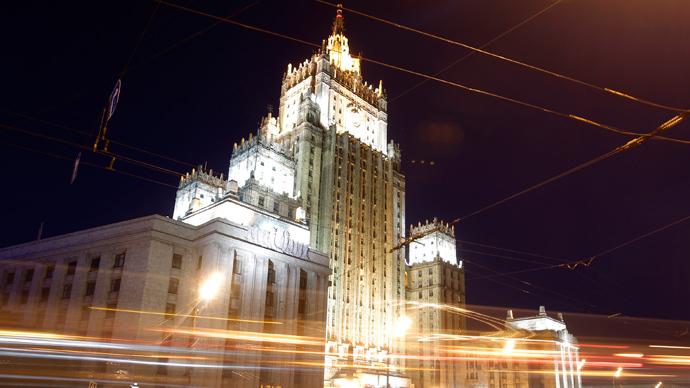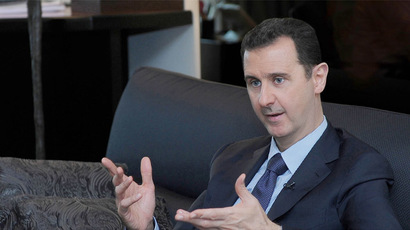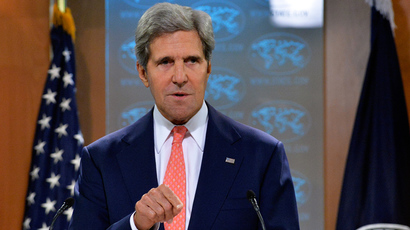Washington’s threats to attack Syria unacceptable – Russia

Washington’s threat to use military force against Syria unilaterally is unacceptable, Russian Foreign Ministry spokesman Alexander Lukashevich said in a statement. He urged the US to wait the results of the UN chemical weapons investigation.
Given the lack of evidence, any unilateral military action
bypassing the UN Security Council – “no matter how limited it
is” – would be a direct violation of international law and
would undermine the prospects for a political and diplomatic
solution to the conflict in Syria and will lead to a new round of
confrontation and victims, Lukashevich concluded.
“Instead of executing the decisions of G8’s summit in Lough
Erne and subsequent agreements to submit comprehensive report
from experts investigating possible cases of use of chemical
weapons in Syria to the UN Security Council, in the absence of
any evidence, we hear threats of a strike on Syria,” the
statement read.
Lukashevich emphasized that even “US allies” wanted to
wait for the completion of the UN chemical expert group “in
order to get an unbiased picture of what really happened and
decide on further steps in terms of the Syrian crisis.”
While the international community has yet to be convinced - the
British Parliament rejected a motion authorizing military action
in Syria Thursday - Kerry did say the August 21 attack killed
1,429 Syrians, including no less than 426 children. He also said
the situation was not the same as Iraq in 2003, a memory that has
inspired doubt throughout the UK and the US.
“Our intelligence community has carefully reviewed and re-viewed
information regarding this attack,” Kerry said. “And I
will tell you it has done so more mindful of the Iraq experience.
We will not repeat that moment. Accordingly, we have taken
unprecedented steps to declassify and make facts available to
people who can judge for themselves.”

He went on to outline the suspicions on which US leaders have
formulated their theory.
“We know that the Assad regime has the largest chemical
weapons programs in the entire Middle East,” Kerry continued.
“We know that the regime has used those weapons multiple times
this year, and has used them on a smaller scale but still it has
used them against its own people…We know that the regime was
specifically determined to rid the Damascus suburbs of the
opposition, and it was frustrated that it hadn’t succeeded in
doing so.”
‘No exit polls and preliminary results’
Meanwhile, the United Nations Security Council may have to wait
as long as two weeks before reviewing the final results of an
analysis of samples taken from where chemical weapons were used
in Syria, diplomats told Reuters on Friday. UN Secretary General
Ban Ki-Moon warned representatives from China, Russia, the United
States, Britain, and France, of the time period on the eve of a
possible US missile strike on the Syrian regime.
“The samples that have been collected will be taken to be
analyzed in designated laboratories, and the intention of course
is to expedite the analysis of that sampling that's been
taken," said UN spokesman Martin Nesirky. “This is not an
electoral process, where you have exit polls and preliminary
results.”
“The only result that counts is the result of the analysis in
laboratories and the analysis of the evidence that's been
collected through witness statements and so on," Nesirky
explained, adding that UN inspectors would return later to
investigate several other sites of alleged chemical weapon
attacks.

UN Secretary General Ban Ki-Moon meanwhile briefed
representatives from the Security Council on the ongoing
investigation in Syria. Although the envoys of permanent members
did not comment on the details, two diplomats told Reuters that
analysis of the samples could take up to two weeks, according to
Ban.
This news comes after the remaining UN inspectors in Syria have
moved up their departure time. Most of the 20 scientists and
other UN staff had already left Syria, but a remaining core group
scheduled to leave at 7:00 am Saturday instead left at 4:00 am
Friday. It was unknown if the early departure was because of an
impending US military strike or because of continuing violence in
the streets of Damascus.
The UN has received at least 14 reports of chemical weapons use
in Syria, Reuters reported, and the team of inspectors arrived on
August 18 after months of negotiation. The team, led by Swedish
scientist Ake Sellstrom, had initially set out to analyze three
locations in the Middle Eastern country, but re-prioritized after
a chemical weapons strike killed over 1,000 people on August 21.
“The team was able to do some preliminary work about the three
sites it was initially looking into but it has not been able to
conduct onsite visits… basically because this new priority rose
up while they were in the country,” UN spokesperson Fahran
Haq told Reuters.
“The Secretary General does expect to have some form of oral
briefing from the investigators once they are out of the
country,” Haq continued. “The investigators as currently
scheduled expect to wrap up their work by Saturday morning.”













